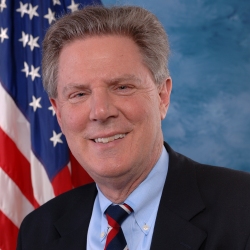NJ Rep. Frank Pallone Aims To Repeal Federal Gambling Laws

Many states are currently considering daily fantasy sports (DFS) betting, or are holding hearings to decide what approach to take over this type of online gaming. However, it seems that the issue may no longer be left to just individual states to decide, if U.S. Congressman Frank Pallone of New Jersey gets his way, as during a recent interview Pallone shared his plans to introduce a new federal piece of legislation to the House of Representatives covering DFS as well as sports betting.
A Call for Reform
In an interview with the Chalk blog written by ESPN’s David Purdum, Representative Pallone said that the current gambling laws are incredibly outdated and in dire need of reform. He believes that it’s time that Congress reexamined the Professional and Amateur Sports Protection Act (PASPA), which was passed 24 years ago and made sports betting illegal in all but four states.
According to Pallone, the time is now right to repeal PASPA and for sports betting become a legal activity, with the Congressman stating:
“The laws need a wholesale review to see how they can actually work together and create a fairer playing field for all types of gambling, both online and offline, including sports betting and daily fantasy sports,”
By starting off with a bill legalizing daily fantasy sports betting, Pallone stated his belief that it may subsequently be possible to strike down PASPA in the future.
Not a New Topic
When the outcry over possible insider trading with daily fantasy sports betting stirred up last year, Congress began discussing the matter. In May 2016, the Commerce Committee then held a formal hearing on the topic, and at the time it soon became clear that some committee members had critical views of DFS betting. One U.S. Representative, Jan Schawkowsky, said that daily fantasy sports betting was little more than sports betting, even though many argue that it’s a game of skill. Nevertheless, Pallone believes that arguing over the definition of daily fantasy sports betting isn’t necessary at all, and that Congress should move swiftly to legalize it.
A New Climate
When the Professional and Amateur Sports Protection Act passed, the world of gambling was very different than it is today. Up until 1989 there were only casinos in New Jersey and Nevada, and the idea of daily fantasy sports betting or online poker had never occurred to anyone.
Today, there are more than 300 tribal-run casinos located across numerous US states, and many other states allow licensed and regulated privately-owned casinos. Lotteries have also expanded with 45 states now offering such products, with some state lotteries even maintaining the use of video poker machines in public places.
Overall, gambling is not seen as the dangerous vice that many thought it to be at the time that PASPA was signed into law. Therefore, it’s very possible that the American public would now support a full repeal of the law or at least wouldn’t object to their lawmakers repealing it. Elaborating further, Pallone commented:
“At the same time, we must ensure the laws are actually creating an environment of integrity and accountability, and include strong consumer protections. I plan to continue discussions with the key stakeholders and then will introduce comprehensive legislation to finally update these outdated laws.”
A Long Road Ahead
While these days the American public has a more positive view of gambling compared to the not so distant past, leading Representative Pallone to soon introduce his piece of DFS betting legislation, a complete repeal of PASPA isn’t going to happen overnight. Professional sporting leagues will all have to be on board if there will ever be a hope for change, and giving his prediction for the industry’s future, sports gaming lawyer Daniel Wallach stated:
“Best-case scenario: one to three years. Outer limit: three to five years. In 10 years, there’s going to be legal sports gambling. You’ll be able to bet on games inside the arena using mobile phones. But without the stakeholders involved, nothing meaningful will happen.”









